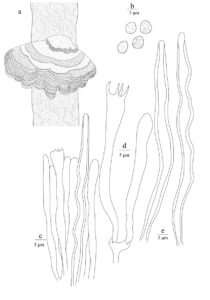Fungalpedia – Note 530, Perplexostereum
Perplexostereum Ryvarden & Tutka
Citation when using this data: Tibpromma et al. (in prep.) – Fungalpedia, Macrofungi.
Index Fungorum, Facesoffungi, MycoBank, GenBank, Fig. 1
Classification: Incertae sedis, Russulales, Incertae sedis, Agaricomycetes, Agaricomycotina, Basidiomycota, Fungi.
Ryvarden (2014) described a new genus Perplexostereum to reclassify Stereum endocrocinum and synonymously with Perplexostereum endocrocinum as the type species in Perplexostereum. Morphologically, Perplexostereum endocrocinum was superficially identified by sight, similar to Xylobolus semipileatus, having all the macroscopic characteristics typical for this species, but prominent cystidia, globose amyloid, and ornamented spores under microscopic examination. It is also similar to species of Dichostereum, but all known species of Dichostereum are resupinate (Ryvarden 2014). Currently, Perplexostereum has only one accepted species, and the genus is characterized by a unique combination of a stereoid pileate basidiocarp, tubular cystidia, rounded, ornamented, and amyloid spores (Ryvarden 2014).
Type species: Perplexostereum endocrocinum (Berk.) Ryvarden & Tutka
Other accepted species: This genus is monotypic.
Figure 1 – Perplexostereun endocrocinum. a Basidiome. b Spores. c Part of hymenium. d Basidium. e Cystidia. Scale bar: b-e = 5 μm Redraw from Ryvarden (2014).
Reference
Ryvarden L. (Ed.) 2014 – Synopsis Fungorum 32. Fungiflora.
Entry by
Lu W, Excellence Center of Microbial Diversity and Sustainable Utilization, Department of Biology, Faculty of Science, Chiang Mai University, Chiang Mai 50200, Thailand; Center for Yunnan Plateau Biological Resources Protection and Utilization, College of Biological Resource and Food Engineering, Qujing Normal University, Qujing, Yunnan 655011, China
(Edited by Saowaluck Tibpromma, Samaneh Chaharmiri-Dokhaharani, & Achala R. Rathnayaka)
Published online 9 December 2024
